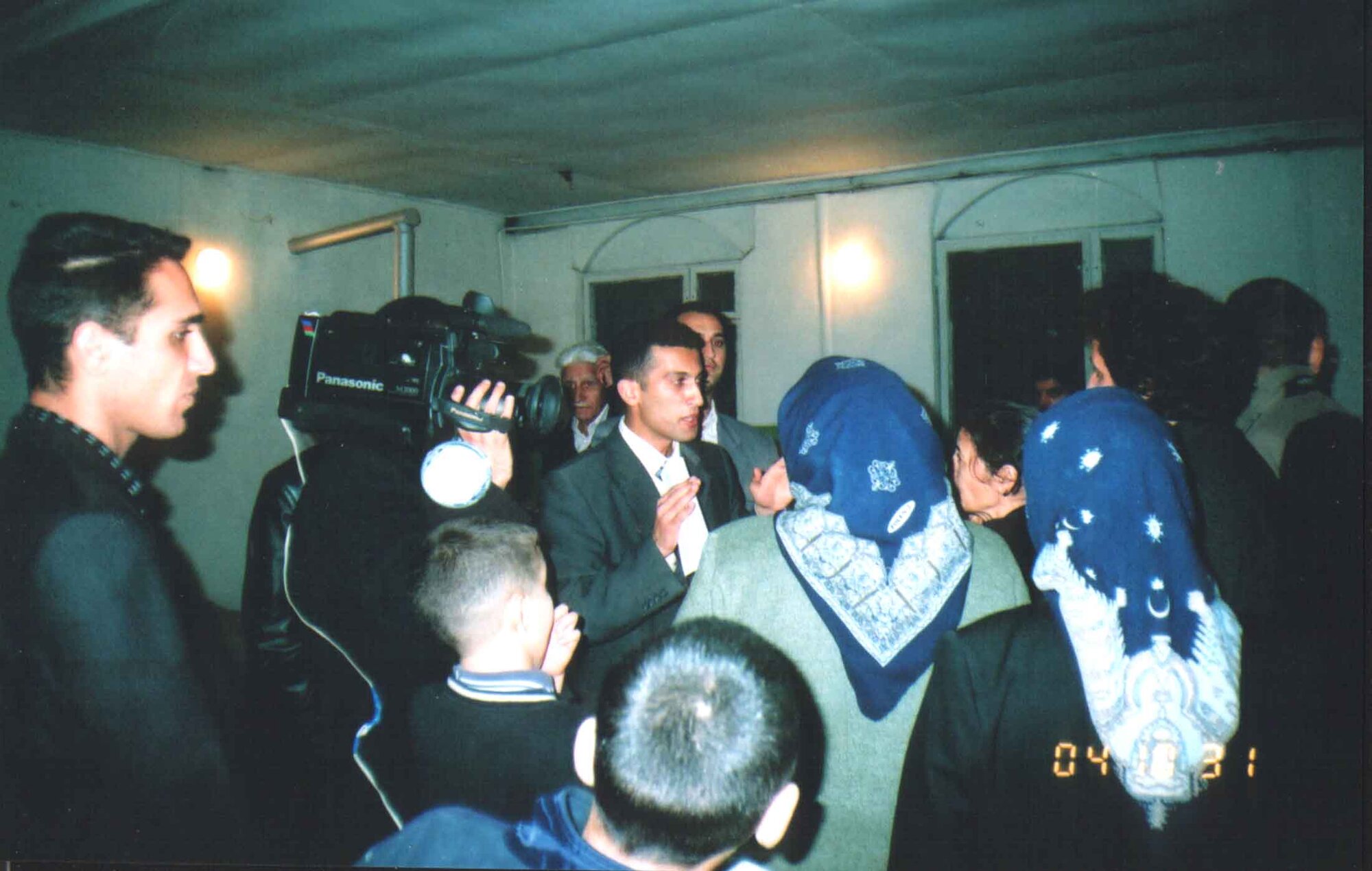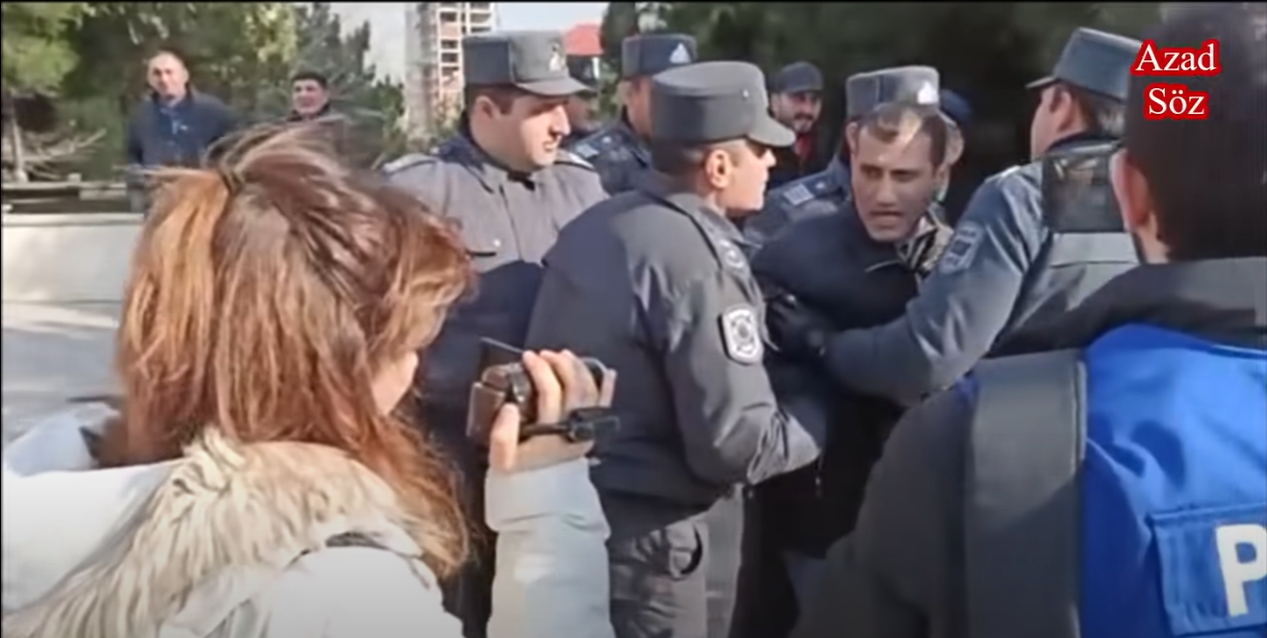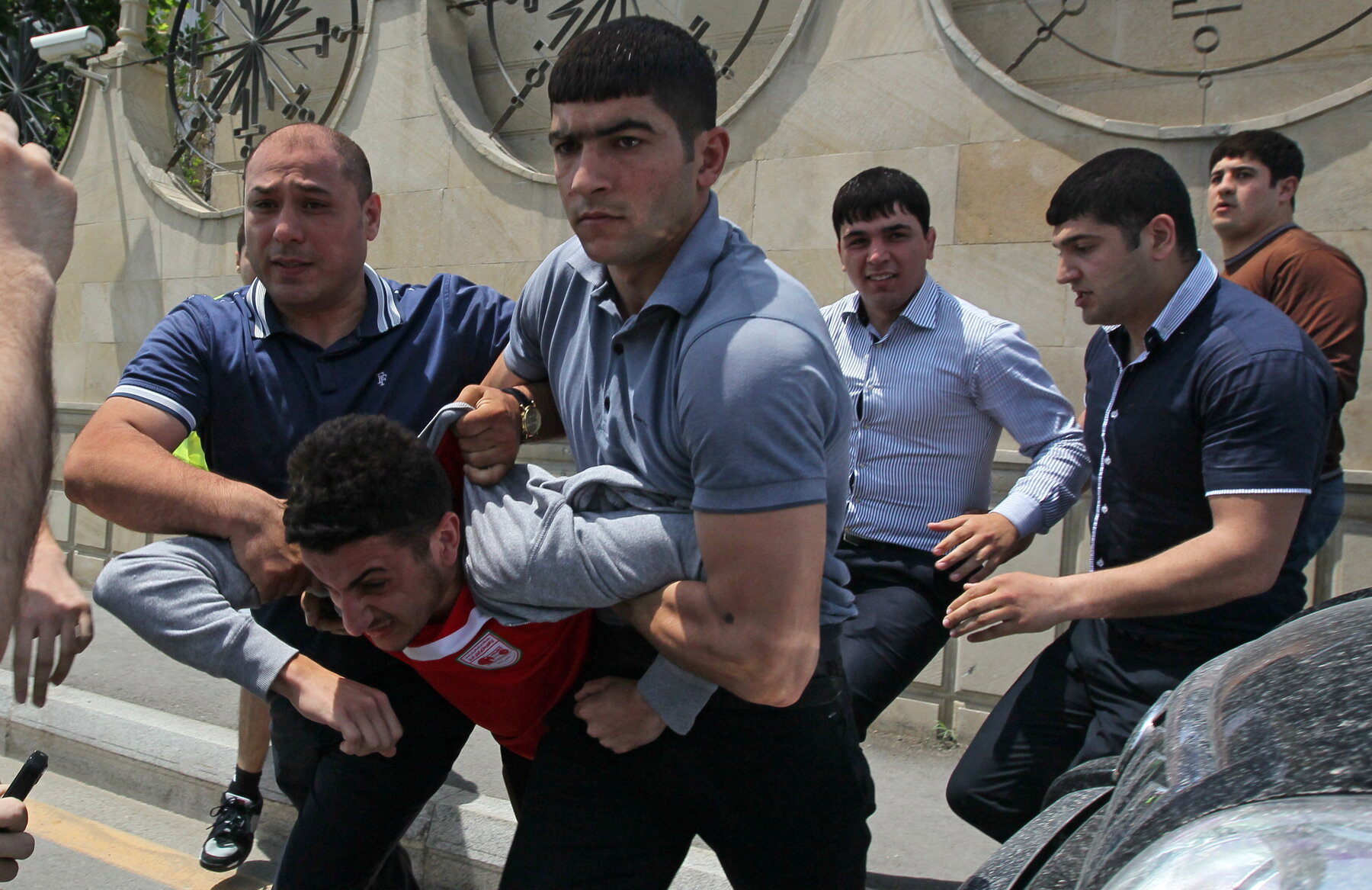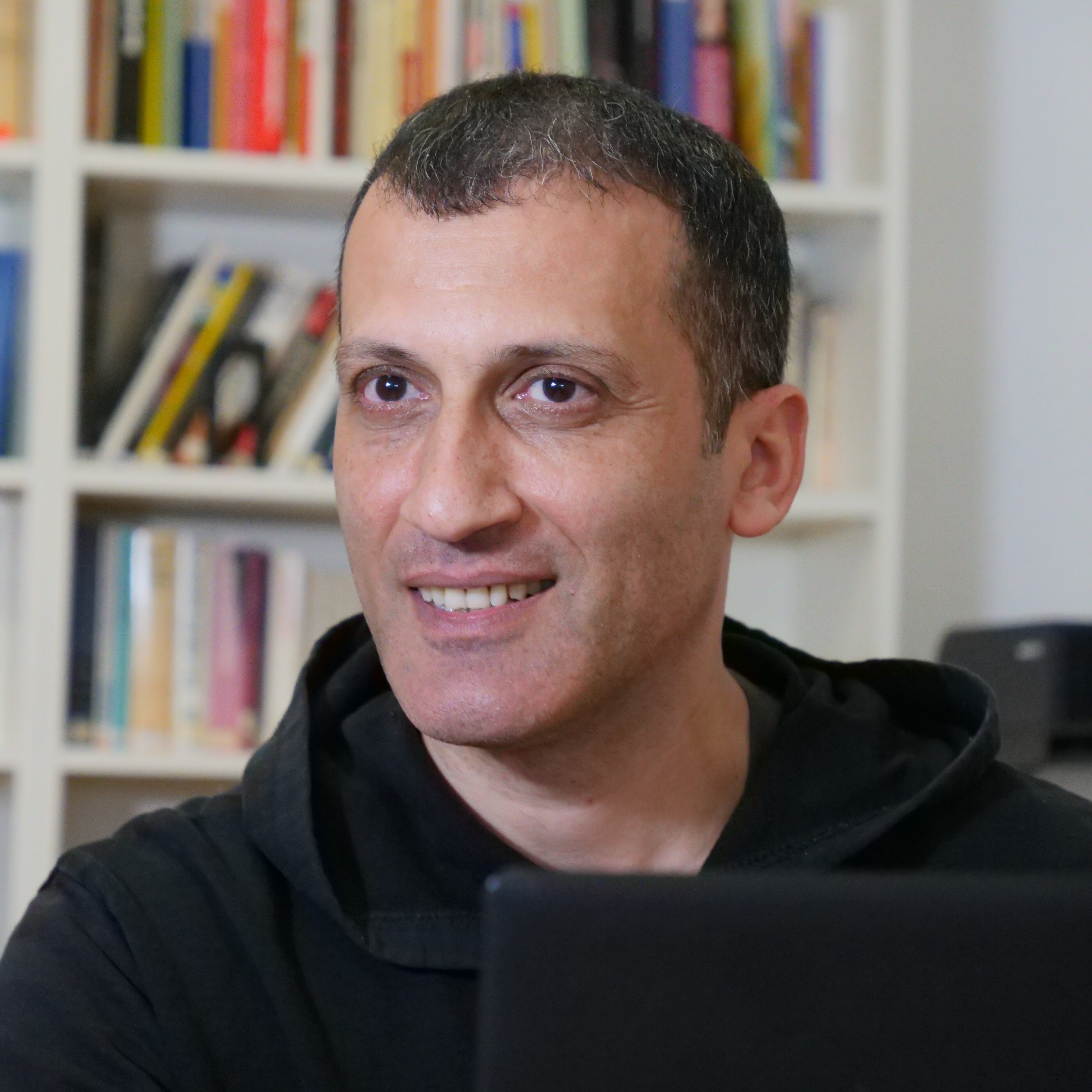"I was beaten every day for months and handcuffed to my iron bed"
For over three decades, Elchin Mammad has fought for human rights in Azerbaijan. Now in exile, the journalist and former political prisoner explains how his home country treats dissidents – and why he’s still fighting.
I was five years old when my little brother, Elshan, fell from the roof while playing hide and seek and died. I was six when my father was killed in an accident at work in the factory, and twelve when my youngest brother died of a terminal illness. It was the last years of Soviet rule, the economy was in ruins and my mother was trying to make ends meet for me and my sister, Sabina, who is three years older than me.
Then the Soviet Union collapsed. In January 1990, Russian troops violently broke up a peaceful rally in Baku, killing 147 demonstrators and injuring just as many. The day before, they had blown up the television station so that the population would not learn about the incident. Nevertheless, the news spread quickly and people from all over the country flocked to the capital to bury the dead. I was only 13 years old when I joined the fight for freedom in Azerbaijan. I was so angry about the Soviets and their violence. It was 1991: I pasted anti-Soviet posters on the walls of houses and persuaded my entire school class to skip class and take to the streets in Sumgait, the city where I lived.
In August 1991, Azerbaijan became independent, but things didn't get any better. The then President Ayaz Mutallimov had close ties to Russia, which led to conflicts. The war over the Nagorno-Karabakh region escalated again, an ethno-territorial conflict between Armenia and Azerbaijan in which tens of thousands died on both sides. In May 1994, a ceasefire was agreed, a kind of “frozen conflict”. In June 1992, Abulfaz Elchibey, the leader of the People's Movement, was elected president. Reforms were undertaken in the country and the situation improved for a short time. There was an education reform, the national currency was introduced, and the military and police systems were modernized. Azerbaijan moved closer to Europe.

At that time, I was leading a youth organisation in high school. We were 14-year-old patriots: we held conferences and invited politicians and historians. In 1998, I began my studies at the Faculty of Oriental Studies at Baku University. That same year, Heydar Aliyev became president, re-established an authoritarian regime and suppressed the opposition, which is still not represented in the country's parliament. I went to demonstrations in Baku and I was arrested along with other opposition leaders. They held me for twelve days at the Bandotdel police station in Azerbaijan, beat me, slammed my head against the wall and gave me electric shocks until I passed out. For days, no one knew where I was.
Under pressure from international organisations, we were finally released on probation. I was expelled from the university. It was only years later that I was allowed to continue my studies. After graduating, I worked as a journalist. In 2005, I founded a weekly newspaper called “Yukselish namine”, which means “For Progress”. It had 16 pages and we reported on civil society issues. For eight years, it was funded by the U.S. National Endowment for Democracy. I ran for parliament – unsuccessfully. Elections are manipulated in authoritarian regimes. In 2005, I married my colleague, Ilhama. We had two children, Seljan and Onur. I continued to write for the newspaper. Political power in the country passed from father to son, Ilham Aliyev, who was even worse. Our newspaper was funded by the U.S. government; otherwise, we would have been under a lot of pressure.

I supported NGOs and worked as a human rights defender. Although I had not graduated from law school, I had taken a number of courses and was able to help thousands of people with my knowledge. In 2019, I investigated the murder of Emin Huseynov, the head of the Prosecutor General's Office, which had caused a stir in Azerbaijan in 2017. I uncovered that the head of the State Security Service, Ali Nagiyev, had him murdered, and that he did so together with the Prosecutor General, Kamran Aliyev. I reported on this in both the local and Turkish media, and legal proceedings were initiated. It was a scandal. And I became a target and was very afraid when I took my children to school. At the end of 2019, I received death threats. In March 2020, I was arrested and put in prison for three years.

Once again, I was subjected to psychological pressure and beaten every day for months. I was often handcuffed to my iron bed. I was not allowed to talk to my mother, my wife or my children. They set dogs on us prisoners; it was a terrible time. I spent time in four different prisons, often crying and despairing. At the same time, I helped my fellow prisoners, preparing appeals and appeal complaints for them and working on petitions, all in secret. Sometimes I was able to get objections upheld and fellow prisoners released. On 44 separate occasions I was able to reduce prison sentences. The joy and gratitude of those I helped was heartwarming.
Many international human rights organisations, including Amnesty International, condemned my arrest and demanded my release. In January 2023, the United States launched an initiative to support the release of political prisoners around the world. I was one of 16 people worldwide to be targeted by the U.S. State Department's “Without Just Cause” campaign. In May 2023, I was released after three years. Azerbaijan has the highest number of human rights violations, political violence and illegal immigration in the world.1 According to the Council of Europe's report on “Prison Populations 2023”, Azerbaijan ranks third on the Council of Europe’s list in terms of the number of prisoners it holds.
Prisoners' rights may be guaranteed by law, but the reality is different: prisoners do not receive legal assistance. Public defenders are disinterested and alleged to be corrupt. My experience during detention taught me that the majority of prisoners do not receive visits from legal representatives. Prisoners, many of whom are illiterate, have to write their own petitions, appeals and complaints. The legal literature in the libraries of the penal system is at least ten years old. It is forbidden to file complaints with the European Court of Human Rights and the UN Human Rights Committee. Court documents must be submitted digitally via the “Electronic Court”. In this system, tools for certified electronic signatures must be used in electronic document traffic. And prisoners don’t even have access to the Internet.
During their detention, most inmates face civil disputes, such as child support claims, divorce proceedings or credit debts. The prisoners are confronted with unsolvable legal problems. While I was still in prison, I sued the Department of Corrections at the Ministry of Justice and Prison No. 16, where I was incarcerated during my arrest, demanding that prisoners be allowed to use certain websites on the internet under supervision. However, the local court and the courts of appeal and cassation did not uphold the claim. I have since filed a complaint with the European Court of Human Rights. The case is now being reviewed there.
I have been in Germany since March 2024, giving interviews to the media and writing about the systematic suppression of independent media and the rigging of parliamentary elections. THE LAST ELECTIONS TOOK PLACE this past September and Aliyev’s ruling party retained power. Politicians, journalists and representatives from civil society are harassed and arrested for writing critical articles. There are currently more than 300 political prisoners in Azerbaijan. I am 46 years old, separated from my family, but I would rather be in exile than in an Azerbaijani prison. My daughter is 18 and my son is 15 years old. We talk on the phone every day. I don't think I can go back.
ifa is committed to protecting human rights defenders and artists with its protection programmes. Since 2022, the Elisabeth-Selbert-Initiative has been offering human rights defenders at risk a safe place, together with host organisations, which they can use for recreation, trauma treatment, professional exchange, and networking. The initiative is implemented by ifa with funds from the German Federal Foreign Office. It also brought Elchin Mammad to Germany.
Footage of Elchin's arrest
Elchin's arrest starts at minute 2:30 in the video.
Footnote
1: https://turan.az/en/politics/us-report-cites-litany-of-abuses-in-azerbaijan-779692
https://fom.coe.int/en/alerte/detail/107640868
https://turan.az/en/politics/us-congress-to-introduce-first-ever-sanctions-bill-targeting-azerbaijani-officials-over-right-violations-779652
https://www.europarl.europa.eu/doceo/document/B-9-2024-0230_EN.html
https://turan.az/en/politics/un-expert-raises-alarm-over-prosecution-of-human-rights-defenders-in-azerbaijan-783665
Additional Sources
https://turan.az/en/social/the-year-2023-is-characterized-by-pressure-on-the-media-776380
https://www.hrw.org/world-report/2023/country-chapters/azerbaijan?fbclid=IwAR2noU8lL3jDCCWNUlmUuCv7QYUbwCqS6xEhZfN2ij_BlbJb7jHqGKCVefU
https://turan.az/en/politics/us-congress-to-introduce-first-ever-sanctions-bill-targeting-azerbaijani-officials-over-right-violations-779652
https://turan.az/en/politics/us-report-cites-litany-of-abuses-in-azerbaijan-779692



